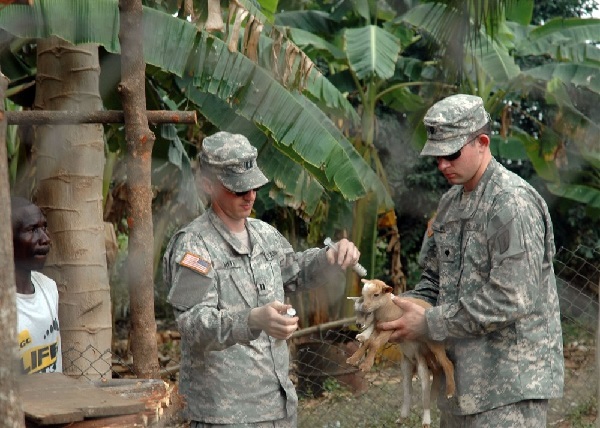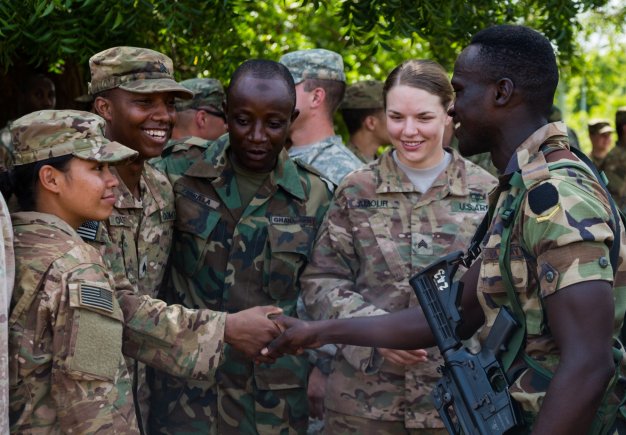The media in Ghana on Monday, March 19, 2018, intercepted and disseminated the content of the Ghana-US Military Agreement.
The Ghana-US Military Agreement intercepted by the media suggests that Cabinet has approved a number of Ghanaian facilities an unrestricted access and tax exemptions to the United States Military.
The agreement will permit the U.S. Military to use Ghana as a base for staging and deploying forces.
The content of the Ghana-US Military Agreement has triggered a sharp division in thought mainly amongst the opposition NDC and the incumbent NPP members of Parliament.

The Minority in Parliament is of the view that when the agreement is approved by Parliament, Ghana will lose her credentials as a Sovereign State.
“The agreement has been drafted in a manner that does not state a termination point. In other words, it would exist in perpetuity. This, therefore, binds all successive governments and yet little or no input was sought from political stakeholders especially those with the capacity to form the government.â€

You Might Enjoy: US Military base agreement is a betrayal to AU - Asiedu Nketia
 The Minority added that “We find the non-availability of restraints on movements of United States Army personnel in Ghana as spelt out in Article 12 of the agreement, troubling, as it opens up the country in a manner that undermines both our sovereignty and securityâ€. Minority Leader Haruna Iddrisu said in a statement.
But the Minister of Defence, Dominic Nitiwul in a radio interview on March 20, 2018, stated categorically that the Agreement does not permit an establishment of a Military Base in the Ghanaian jurisdiction, rather it is to further clarify the status of U.S. Military personnel and their activities with the Ghana Armed Forces.
The Defence Minister added that Ghana Armed Forces has had a long-standing arrangement with U.S. Military when it comes to joint training and other operational activities within Ghana, hence the Agreement makes provisions of the status, rights, and obligations conferred on the U.S. personnel.
Dominic Nitiwul in a presser on Wednesday, March 21, 2018, presented a 1998 agreement signed during former President Rawlings’ administration with the United States.
To buttress his earlier statement that Ghana Armed Forces has a long-standing arrangement with U.S. Military, He produced an Acquisition and Cross-Servicing Agreement signed by then Foreign Minister Hannah Tetteh on behalf of Ghana in 2015.

The Minister of Defence Dominic Nitiwul after presenting both documents entered into by the previous government concluded that the Defence Cooperation Agreement between Ghana and US government is just the combination of
the two previous agreements entered into by the two countries.
Differences in the 1998 and 2018 Ghana-US Military Agreement
The 2018 agreement requires more stringent commitments from Ghana as compared to the 1998 agreement.
In clause 2 of Article 2 of the agreement permits the US Army the right of …“refuelling of aircraft; landing and recovery of aircraft, accommodation of personnel; communications; staging and deploying of forces and material…†This is not seen in the 1998 agreement.
Secondly, portions of the 2018 agreement state that, “Ghana hereby provides unimpeded access to and use of agreed facilities and areas to United State forces, United States contractors, and others as mutually agreed. Such agreed facilities and area: or portions thereof, provided by Ghana shall be designated as either for exclusive use by United States forces or to be jointly used by United States forces and Ghana. Ghana shall also provide access to and use of a runway that meets the requirements of United States forces.â€
This colossal privilege to the US Military is missing in the 20 years old agreement.
Also, the much-criticized part of the 2018 agreement which has no trace from the 1998 agreement is the portion that reads; “United States forces and United States contractors may undertake construction activities on, and make alterations and improvements to, agreed facilities and areas. United States forces may carry out construction works and other services with military personnel and civilian personnel.â€
The Americans are further “authorized to control entry to agreed facilities and areas that have been provided for exclusive use by United States forces.â€
Similarities in the 1998 and 2018 Ghana and US Military Agreement
With the 1998 agreement, it was captured that “US military personnel and civilian employees of the US Department of Defence who may be temporarily present in Ghana in connection with the Africa Crisis Response Initiative and other activities [should]…be accorded the status equivalent to that accorded to an administrative and technical staff of the United States Embassy under the Vienna Convention on diplomatic relations of 18th April 1961, and that they may enter and exit Ghana with United States identifications and with collective movement or individual travel orders.â€
The above excerpt agreement is replicated in the 2018 agreement. In Article 3 Clause 1 states, “Ghana shall accord to military personnel and civilian personnel the privileges, exemptions, and immunities equivalent to those accorded to the administrative and technical staff of a diplomatic mission under the Vienna Convention on Diplomatic Relations of April 18, 1961.â€
Coupled with, the 1998 agreement demanded that “the Government of Ghana accord duty-free importation and exportation as well as exemption from internal taxation on products, property, material and equipment imported into or acquired in Ghana by the United States Government in connection with their official activities.â€

The 2018 agreement seeking Parliamentary approval also says “Vehicles, vessels, and aircraft owned or operated by or exclusively for the US Armed Forces shall not be subject to the payment of landing or port fees, pilotage charges, navigation or overlight charges or light and harbour dues while in Ghana; however, the United States Armed Forces shall pay reasonable charges for services requested and received. Such aircraft shall observe local air traffic control regulations while in Ghana. Such vessels shall not be subject to compulsory pilotage at Ghanaian ports. Finally, the Embassy proposes that both governments waive any and all claims (other than contractual claims) against each other for damage, loss or destruction of the property of the Department of Defense of the United States or the property of the Ministry of Defense of Ghana arising out of activities related to official duties, or for injury or death suffered by military personnel while engaged in the performance of their official duty.â€
Lastly, the 1998 agreement sought that “personnel be authorized to wear uniforms while performing official duties and to carry arms while on duty if authorized to do so by their orders.â€
In the 2018 agreement, it provides that “Military personnel may possess and carry arms in Ghana, while on duty if authorized to do so, by their orders, such authorization being made in consultation with the appropriate authorities of Ghana. Military personnel may wear their uniforms while performing official duties.â€
Meanwhile, Government is set to make another attempt to lay the Defence Cooperation Agreement between Ghana and the United States in Parliament today March 23, 2018.





